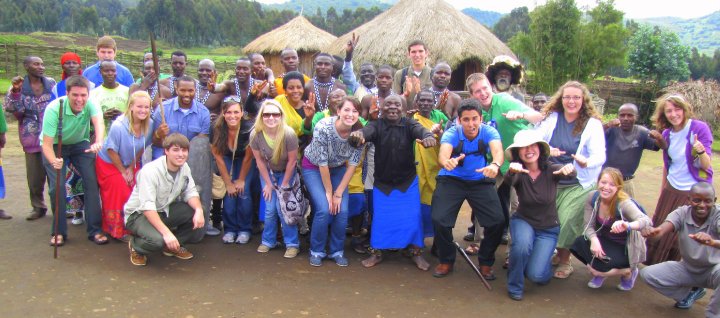Thursday P.M.:
After a delicious buffet lunch, we went to the Nyamala site. Before the guide explained things to us, we just walked around. It was a much bigger main building than the first one, which means that more people were hiding there; 10,000-11,000 people were killed there on the day the Interahamwe1 arrived. The layout was similar to the first church – clothes lying on pews, blood stains remaining, bullet holes in the roof. There were more bones displayed, and some were just in large bags in one area because they were remains recently found by family members. One family brought in the bones of their loved ones while we were there and laid them out. It was surreal and terrible. In the mass graves about the area, there are about 45,000 people buried. That number is less than 10% of the total number of people killed in 1994.
I don’t know how I would have taken all this if we hadn’t had to watch those films earlier in the semester. In March I could not understand why we needed to go through that but now I see that it has kept me from falling apart in these two experiences. At the very least, I was unsurprised.
Bosco told us lots about the genocide and things like that from personal experience. He told us some of his story, but also said that it was hard for him to talk about. I can't even imagine.
How we managed to move from that to normal activities again is beyond me…except that Emily had her Fujifilm camera that produces instant photographs, and a few children walking on the street got to take a picture of themselves home with them. Seeing the joy that this brought to them provided for a slight lightening of the sadness.
On the way to the market, we had some exciting moments. The first was seeing Paul Kagame, ol’ PK himself, driving down the street! We all freaked out, basically. The next time we freaked out was less desirable; Katey asked an RPF soldier if she could take his photo. The man’s eyes turned an angry shape in very little time. Oh and he was holding a gun. So that was a ‘no.’
The market was an interesting experience for me, mostly uncomfortable because there were so many people and they were all talking to you. This is not my preferred method of communication or transaction. Bargaining is also not too fun2; since I was so new to it and it was tiring, I gave up after buying a few things. I needed more time to take it all in.
While we were waiting at the bus for a bit for everyone to be done, Travis and Campbell prayed for a boy with a broken elbow. Then Campbell got our bus driver to translate while he shared the Gospel with a gathering crowd of men and boys (because we're told that the women are the ones doing the work and the men are always sitting around here, which I've seen and it's interesting...but great because they got to hear the Gospel! Fun stuff.) And others then went out and just started loving on people. It was beautiful. So awesome - anointed to preach good news to the poor, like in Isaiah 61. As we drove away, one man who had decided to follow Jesus shook Campbell’s hand through the window and said something like, “Thank you for the gift you gave me.”
Devotional/Debriefing time:
We reflected on the full day and our reactions.
- We talked about how it felt wrong to be taking photographs in the churches, but that it is needed so that we can help others remember.
- There is a view that some hold that Christianity is for and from white people, and is therefore distasteful to many who remember that white Europeans brought about the division between the people of Rwanda.
- The mothers in Rafiki Village sacrifice most other things in their lives in order to love the children. They’re supposed to be committed to raising those kids.
- Ways to market and sell things at home that we saw in the market.
- The incredible lifestyle gap – even just looking at the market kids and the Rafiki kids.
Dr. Wu encouraged us to think about where to go from here – how can we constructively use what we’ve seen and done and learned, and combine that with ministry? We should look to serve everyone better.
For supper, We walked to a sweet Indian restaurant of deliciousness. Our end of the table was ridiculous. Despite or because of that, we came up with great entrepreneurial ideas such as are listed in my Business Ventures page, a link to which you will see on the right.
1 The Interahamwe was not state-run, but was one of the main groups involved in the genocide – sort of a paramilitary collection of killers.
2 My personal reflection.
Things of note:
• An inchinyomoro is kind of like a wee pomegranate. Tide pens are hard pressed to get out the stains.
• Keeping the glass soda bottles is not kind. They always want them back.
• Bus rides are the perfect chance to drive people crazy with mind games.
• One of my Bibles now belongs to a new Rwandan Christian.
• Can you play this game? Listen to me: if Rwanda is a cup and my pet cricket likes sunlight, we will spend 3 days in Chicago. This is deep, but your teeth are profound. Bang bang bang! Who’s dead? It is Travis’s watch, which is not a cup.
23 May 2010
Subscribe to:
Post Comments (Atom)




No comments:
Post a Comment